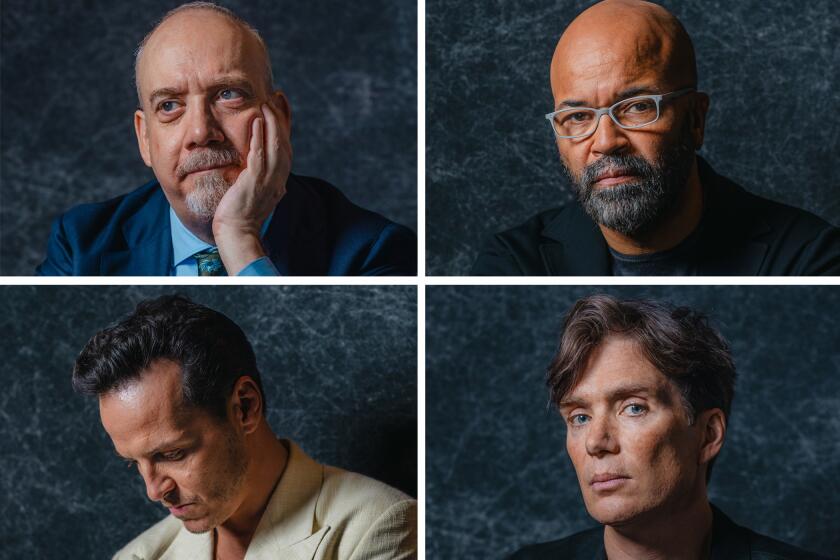Nicolas Cage, Kristoffer Borgli and the interpretation of ‘Dream’
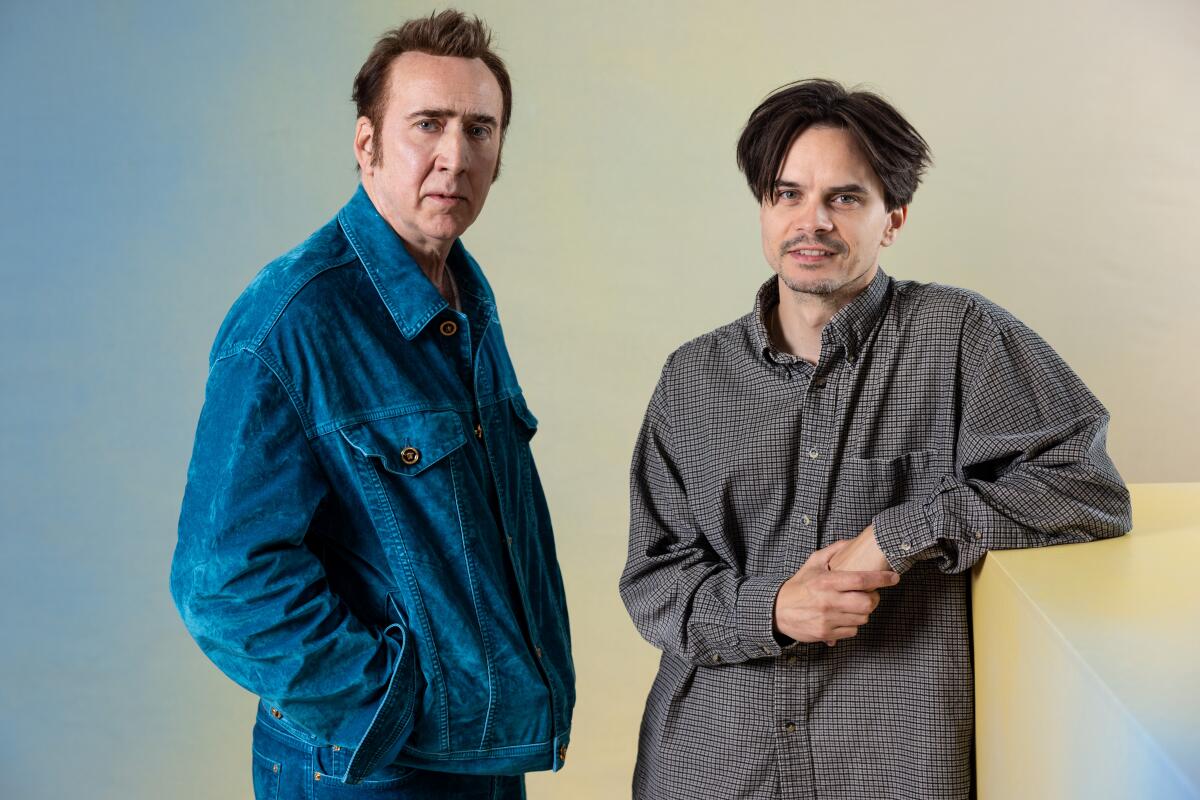
- Share via
Dreams can be confusing, revelatory, even emotional; they can go through many movements, like a film of many genres. And all of that is in the surreal, hilarious, disturbing and moving “Dream Scenario,” the second feature from writer-director Kristoffer Borgli. It stars Nicolas Cage in one of his sharpest, most affecting performances (one he acknowledges as a favorite), as Paul Matthews, a man who discovers the dark complexity of fame, with its unexpected edges. And for it, Cage drew on one of the surreal scenarios from his own life, his meme-ification.
“My first response was to the title: two of my favorite words, ‘dream’ and ‘scenario.’ And then I read the script and I felt the originality,” says the Oscar winner. “But then I felt, ‘I know how Paul feels,’ because my response to what happened to me virally was the same thing; My meme-ification is similar to Paul’s dream-ification. I said, ‘Yes, now I can take these heavy feelings and do something constructive, take the lead and turn it into a little bit of gold.’ ”
Memes of Cage, usually taken from his most extreme moments on film, are all over the cyberverse. Such a thing is inevitable, one supposes, when an actor has been around for more than 40 years and 100 movies, especially when the point of meme culture is to remove all context to fashion something of a web-commenting Swiss army knife.
“I have subsequently made friends with it, but at the time I was discovering it, I was frustrated by it and I was confused, because it wasn’t what I signed up for,” Cage says of discovering the “Nicolas Cage losing his s—” variants of clips and photos. He says that when he became an actor in the early ‘80s, he never dreamed of “technology where you could take mashups of different crescendo moments from movies without any regard for Act 1 or Act 2 and just turn it into a meme.
Our BuzzMeter film experts are back to predict what Oscar voters will nominate in 10 Academy Awards categories. Vote in the online polls!
“Now, I’m happy about it, because it kept me in the [conversation], and some of my more maximalist performances provided vicarious release to some folks. In society, we all want to behave. We all want to be good members of the community, but sometimes we want to scream. And I think that’s why it landed with that group.”
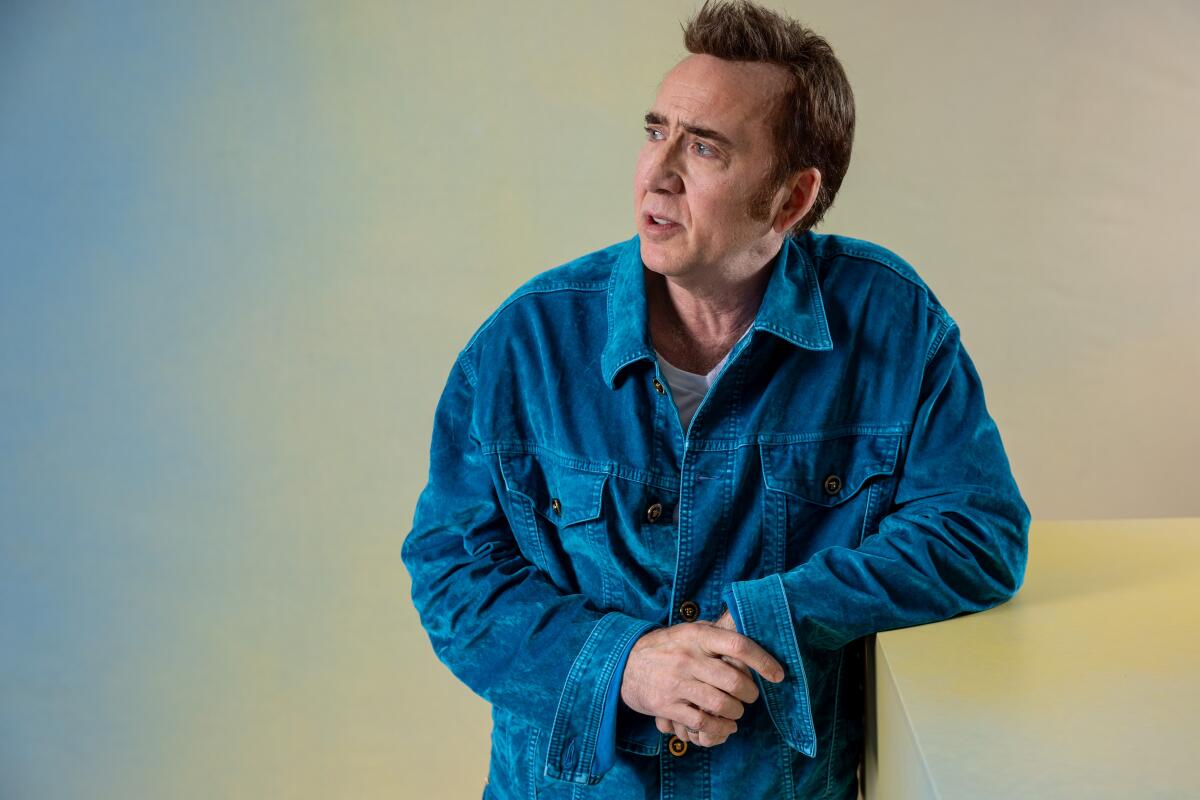
This miasma of mockery and admiration is relevant again to the actor because of the unexpected viral notoriety of his character in “Dream Scenario.” Paul Matthews is an underappreciated (in his view) academic who has a pretty good life. He has a loving wife, two daughters, a good job doing what he loves: talking about the evolution of consciousness, especially in lower life forms (he coins the term “antelligence”). Then Paul discovers he’s appearing in other people’s dreams. Not just friends and family, but people who’ve never met, seen or even heard of him.
Making the film much more effective, much more interesting, Borgli approached it with no respect to genre boundaries. Is “Dream Scenario” a comedy? A tragedy (a principled man gets the attention he craves — at a terrible cost)? A horror movie, a romance, a satire on modern fame and cancel culture? Yes.
“I’m interested in experiencing a confusion with genre — in art or music or anything — that’s confusing me in a delightful way, where I don’t have a box to put it in so I’m forced to categorize it on my own,” Borgli says, sitting beside his lead actor in a booth at the restaurant in the Beverly Hills Hotel. “I’ve become sort of an active participant in cataloging the experience. And sometimes I can’t figure out the tone.”
The actor has been up and he’s been down. He’s earned excellent reviews for his latest, ‘Pig,’ and looks forward to more projects.
“I like that he has the guts to stay true to his vision,” Cage says. “They’ve kind of put the label ‘comedy’ on ‘Dream,’ but to me, it’s not only a comedy; it’s so much more than that. There’s some tragedy there. There’s this scene where Paul is in the nightmare mode [having gone from benign dream visitor to threatening figure]. He’s bludgeoning a student with a hammer. I knew when I was filming it it would be shocking, and I could see where some folks might say, ‘That maybe is a little too much.’ They want this to be a comedy. But he stayed true to that. And I admired it.”
The film is an impressive feat for such a newly minted auteur. Borgli (who edits his films as well), cuts with tremendous confidence, creating flow, tension and jagged edges where he wants them. Even his use of sound is considered. In one scene, Paul goes to lunch with a former colleague to confront her about what he perceives to be her plagiarism of his ideas. He surreptitiously records it on his phone. Midway through the meeting, we cut to Paul in the car afterward, listening to the audio of what just happened. Borgli uses the phone’s playback over the vivid footage of the scene, placing the audience simultaneously in the car with Paul remembering what happened, and in the immediacy of the moment, feeling how fresh and present his humiliation is.
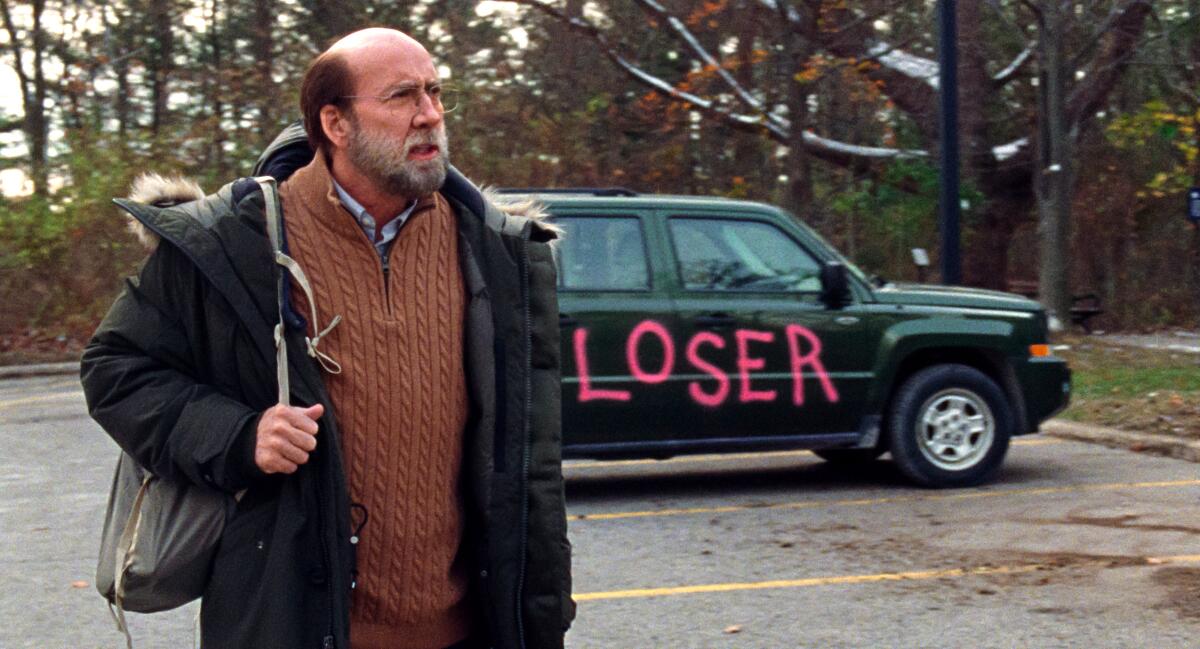
Cage transformed for the role, into schlubbiness personified. Paul is pot-bellied, balding, bespectacled and forgettable the instant you meet him. He’s a principled, intelligent person who speaks with a hint of a nasal whine.
Cage says, “Kristoffer showed me a few pictures of evolutionary biologists: ‘Oh, I like that. He’s got that sort of Benjamin Franklin-horseshoe hairdo.’ We built the look together. He changed the shape of my nose. I’ve been wanting to make my choices more personal. The filter is in the look and the way I speak as the character. But the emotion, I felt it got pretty close to home.”
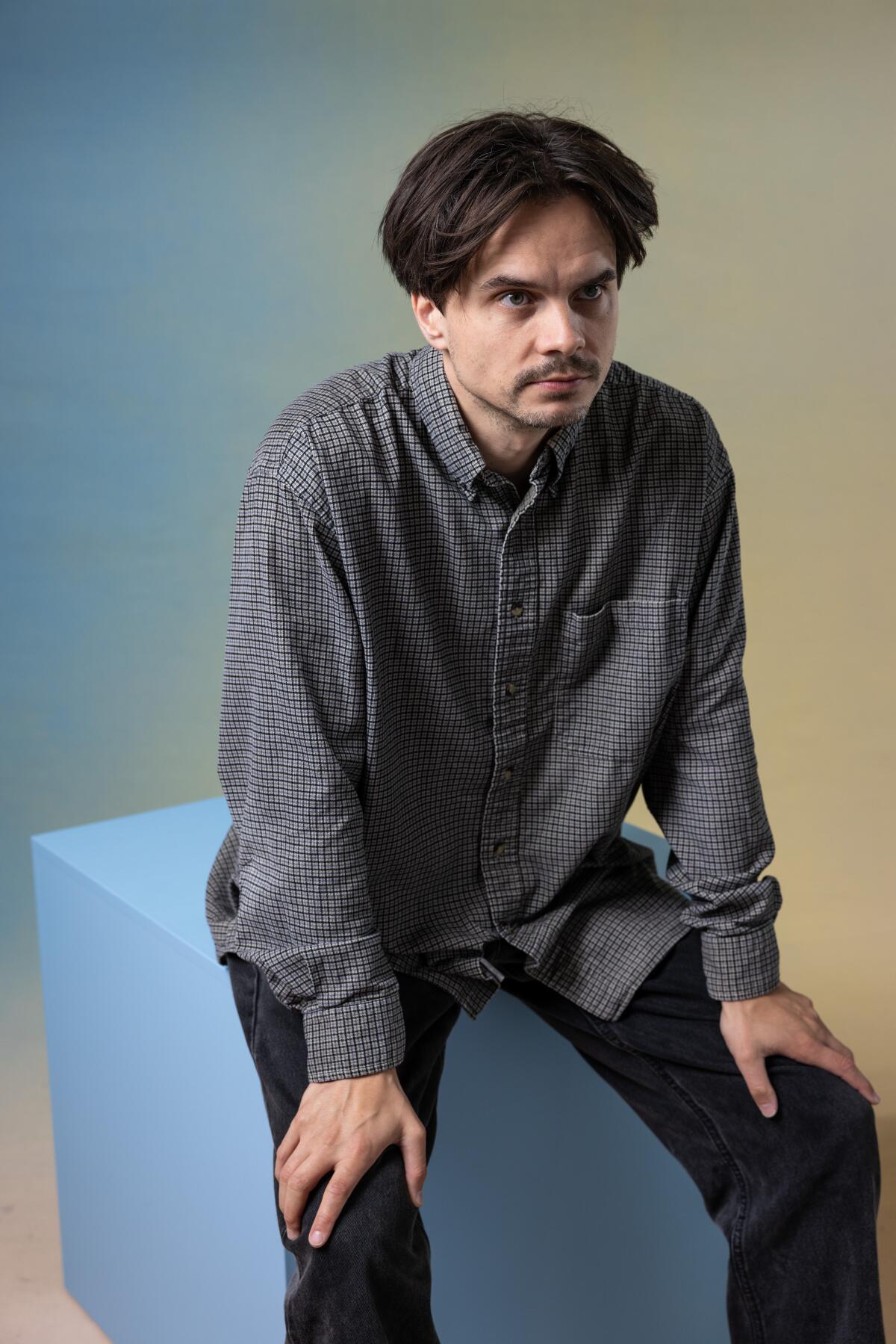
Borgli says, “Some of the behavior comes from a certain type of entitled, ambitious person who hasn’t got what he thinks he deserves yet. Some of his negative traits I can locate in myself, one being the horrible feeling of confidently telling a bad joke. Also, my father’s a social anthropologist; my secondhand embarrassment from my father has been, through my teenage years, very strong.”
“Did he do the wine thing?” Cage asks, repeating the absurd gesture Paul makes of miming drinking wine at a highfalutin dinner.
“I could see him doing it, definitely,” says Borgli, acknowledging that his father has seen the film (but not detailing his reaction to it).
One might be struck by the film’s frank, almost deadpan representations of dreams and carry that long after seeing the film; or one might be most affected by the powerful emotion of its wistful ending. But one of the most indelible memories viewers will take away is how present, alive — and excruciating — its key sex scene is. It’s a momentary indiscretion that ends up having lasting repercussions, and it makes viewers laugh and scream, sometimes simultaneously.
“What was most important, I think, for was never to go for laughs, that we would play this like a drama and we would try to get into the real organic nature of what was happening and play it authentically,” says the actor. “Dylan [Gelula], what a stroke of genius to cast this young lady. She’s wonderful. She’s effortless. I don’t see the actor. It was magic working with her, and it was easy to shoot. It just flowed. We knew where we had to go.
“I wanted you to hide under the table. I wanted that feeling almost to be with you. That Paul would go to bed at night and he wouldn’t be able to get that scene out of his head and he’d have to throw an alarm clock.”
Borgli says, “We discussed that the characters are all helplessly stuck inside of a drama, and that’s the way that the audience will experience the comedy.
“I had to move my monitor into a different room, because, of course, I was seeing it as a comedy in that moment while the characters were stuck in the drama. And I didn’t want to ruin that moment, so I was just stuck in a different room, laughing and cringing, all that stuff. And also when I was editing that scene, something strange happened. I was sitting at my computer and then suddenly I was in the kitchen, and I was like, how did I get to the kitchen? And I go back to editing and then it happens again, and I don’t notice that I’m removing myself from the computer. It’s so embarrassing to watch. I felt so cringey that I just subconsciously remove myself and think that I need to make coffee or something. It took me days to edit that scene. I had to walk away from the monitor constantly.”
More to Read
From the Oscars to the Emmys.
Get the Envelope newsletter for exclusive awards season coverage, behind-the-scenes stories from the Envelope podcast and columnist Glenn Whipp’s must-read analysis.
You may occasionally receive promotional content from the Los Angeles Times.
